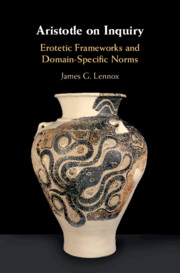Book contents
- Aristotle on Inquiry
- Aristotle on Inquiry
- Copyright page
- Dedication
- Contents
- Figures
- Preface
- Abbreviations
- Introduction
- Part I Erotetic Frameworks and Domain-Specific Norms
- Chapter 1 The Goal of Knowledge and Norms of Inquiry
- Chapter 2 An Erotetic Framework
- Chapter 3 A Discourse on μέθοδος
- Chapter 4 Natural Science
- Part II Norms of Natural Inquiry
- Bibliography
- Index Locorum
- General Index
Chapter 2 - An Erotetic Framework
The Posterior Analytics on Inquiry
from Part I - Erotetic Frameworks and Domain-Specific Norms
Published online by Cambridge University Press: 07 May 2021
- Aristotle on Inquiry
- Aristotle on Inquiry
- Copyright page
- Dedication
- Contents
- Figures
- Preface
- Abbreviations
- Introduction
- Part I Erotetic Frameworks and Domain-Specific Norms
- Chapter 1 The Goal of Knowledge and Norms of Inquiry
- Chapter 2 An Erotetic Framework
- Chapter 3 A Discourse on μέθοδος
- Chapter 4 Natural Science
- Part II Norms of Natural Inquiry
- Bibliography
- Index Locorum
- General Index
Summary
Chapter Summary. The second book of the Posterior Analytics is a sustained investigation of different modes of inquiry aimed at achieving scientific knowledge. So understood, it has far more unity than is typically claimed for it, and its last chapter is a fitting conclusion. But it does not present, let alone defend, substantive norms to guide distinct scientific inquiries. Those norms are domain-specific and as such are presented and defended in the introductions to Aristotle’s scientific treatises themselves. What, then, is accomplished by APo. ii? In this chapter, I introduce and defend the idea that APo. ii provides an erotetic framework for any inquiry, provided only that its goal is epistêmê, demonstrative knowledge. As such, it can be thought of as providing metalevel norms, for example, about how different inquiries ought to be staged, or about how inquiries aimed at formulating definitions are related to those aimed at achieving causal demonstrations.
- Type
- Chapter
- Information
- Aristotle on InquiryErotetic Frameworks and Domain-Specific Norms, pp. 37 - 64Publisher: Cambridge University PressPrint publication year: 2021



